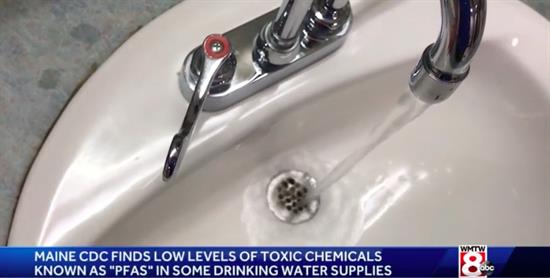Press Releases
Pingree Joins Bipartisan Push to Clean Up Forever ChemicalsComprehensive Bill to Regulate ‘Forever Chemicals’ Includes Pingree Initiative to Publicize Information about PFAS-Free Household Items
Washington,
April 19, 2021
Congresswoman Chellie Pingree (D-Maine) joined Representative Debbie Dingell (D-Mich.), Fred Upton (D-Mich.), and 23 other members of Congress in introducing comprehensive, bipartisan legislation that aims to protect all Americans and our environment from harmful forever chemicals known as per- and polyfluoroalkyl substances (PFAS). The package would establish a national drinking water standard and designate as hazardous select PFAS chemicals to allow the Environmental Protection Agency (EPA) to clean up contaminated sites in Maine and across the country, as well limit industrial discharges and provide $200 million annually to assist water utilities and wastewater treatment. “PFAS are dangerous chemicals that pose serious risks to every Mainer, appearing at our former military installations, farms, and water systems. This is an urgent public health and environmental threat, and it’s growing at an alarming rate—in Maine, there have been more than 30,000 records of PFAS at close to 250 sites across the state, said Pingree. “This legislation will provide sweeping, comprehensive reform to protect the American people from forever chemicals. I’m particularly proud that this bill includes my initiative to expand EPA’s Safer Choice label, which will help families find and buy products that keep their families healthy and safe.” The PFAS Action Act would do the following to protect our air, land, and water from harmful PFAS contamination:
A provision authored by Congresswoman Pingree to expand EPA’s Safer Choice label to include household products was included in this legislation. Under the bill, EPA’s Safer Choice label would be expanded to household products like carpets, rugs, clothing, or upholstered furniture that don’t contain PFAS. Carpet is currently the number one source of PFAS exposure for young children, who spend lots of time sitting, lying, or crawling on carpets. PFAS chemicals are man-made chemicals that have so far been found in the drinking water of more than 2,000 communities. PFAS chemicals are persistent, bioaccumulative, and toxic. These chemicals have been linked to harmful human health effects, including cancer, reproductive, and developmental harms, and weakened immune systems. In January 2020, the U.S. House of Representative took bold action and passed the PFAS Action Act by a vote of 247-159, including 24 Republicans supporting the package. According to the Environmental Working Group (EWG), 328 military sites across the United States have confirmed PFAS contamination and over 200 million Americans are drinking contaminated water. Maine has several PFAS contamination sites, including the former Brunswick Naval Air Station, the former Loring Air Force Base in Aroostook County, and the Kennebunkport, Kennebunk, and Wells Water District. As Chair of the House Appropriations Subcommittee on the Interior, Environment, and Related Agencies, Congresswoman Pingree works to secure funding for the EPA to conduct research to understand the health effects of PFAS and develop regulatory standards for drinking water and site cleanups in the appropriations process. You can read a copy of the PFAS Action Act here.
### |

